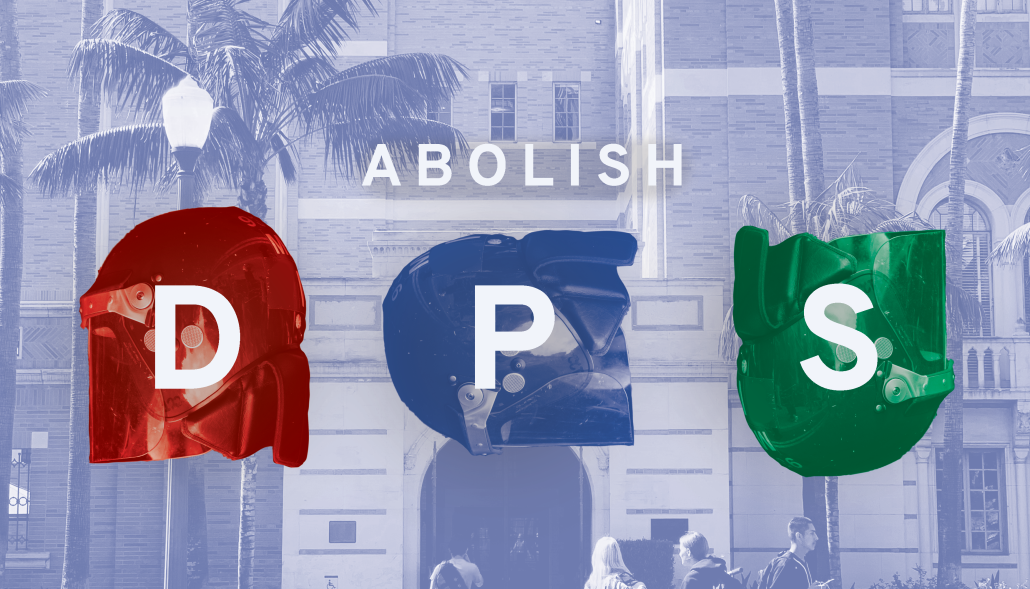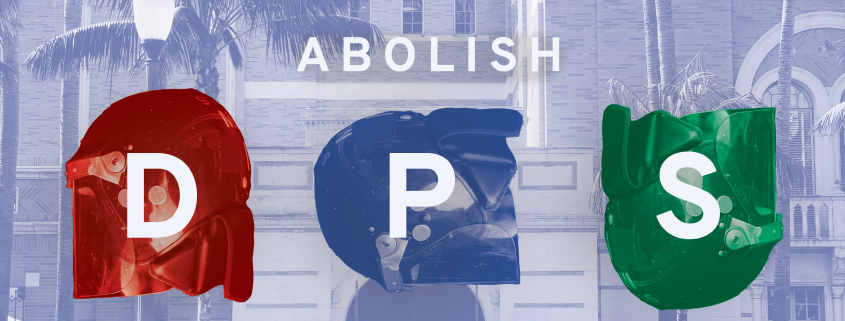Imagining USC as a University Sans Cops

In recent years, cops have been criticized more than they ever have been in America. As Black Lives Matter protests were held all over the country, systemic police brutality was brought to the forefront of the conversation. Movements to abolish the police have seen more support than ever.
But in the midst of all this, it is often asked where the Department of Public Safety fits in. Do they even count as police? Should they be abolished? The answer to both of these questions is yes.
While they may not appear to be, public safety officers, one of the two types of DPS officers, have trained at the Los Angeles Police Academy and share the same powers of arrest as LAPD officers. While possessing these powers, they do not have to comply with legislation that LAPD has to, such as the Racial and Identity Profiling Act.
But the LAPD ties don’t stop there. DPS is operated through a memorandum of understanding they have with LAPD. DPS has even had several controversies hiring those fired from LAPD, employing former officers who were fired for deeds like racial harassment (current USC lieutenant Peter Foster), false statements (current USC sergeant Frank Trevino), excessive force (current USC sergeant Steven Alegre), failure to diligently investigate a fellow officer (current USC sergeant Rodney Peacock) and more.
DPS, like all police, should be abolished. While many call for reforms of this system, this simply is not enough. The damage that police have done cannot be undone by “different” policing, especially as policing was created as a system that upholds racism.
The modern-day police itself began as slave patrols that were formed to return runaway enslaved people to their owners and stop uprisings. Centuries of change and “reform” only have resulted in the continuation and expansion of this racism, such as their enforcement of the Chinese Exclusion Act and their internment of Japanese Americans during World War II.
DPS, another result of reformations, stays true to its racist roots as it disproportionately targets Black and Latinx people. In 2019-2020, 31.7% of DPS stops involved Black people, a demographic that makes up 5.5% of the student body, 8.8% of staff, 3% of faculty and 12% of the people in the University Park area. In 2019, Alpha Phi Alpha, a Black fraternity, and Omega Phi Beta, a Latina sorority, had a tailgate surrounded by a fence and a swarm of DPS officers, while other tailgates did not. DPS does not make campus more safe; it only serves as an apparatus that profiles, arrests and polices people, making them less safe in the process.
DPS doesn’t “protect” USC’s campus — it encroaches upon the surrounding two-mile radius outside of campus, surveilling, patrolling and profiling local residents who, apart from their proximity, have no connection to our institution, with no say on their part. DPS has over 300 cameras on and off campus, tracking countless non-University-affiliated individuals 24/7.
Reform of DPS in particular has resulted in the most milquetoast of changes, such as the creation of the independent DPS Community Advisory Board. CAB oversees DPS but has no power to do anything in lieu of DPS abuse, rendering it about as useful as a pedestrian watching a high-speed car crash is. They can watch all they want, but that doesn’t change anything.
Simply put, police reform does not work, and example after example proves it. How can a system built to be violent toward people of color be reformed to serve these same people? It can’t.
DPS, which had a net operating budget of $48,890,000 in 2018-2019, was “one of the largest private campus public safety departments in the United States” according to its website.
This obscene sum of money could be put toward community-based models that work toward actual safety and support, such as food, shelter and mental health resources that address the needs of those who would otherwise commit crimes out of desperation.
Scholar and activist Angela Davis, who wrote the essential abolitionist text “Are Prisons Obsolete?” (spoiler alert: her answer is yes), was invited by USC last June to to discuss “the various intersections of activism, feminism, prison abolition, politics, writing and more.” Davis also wrote an article aptly titled “California must lead the way in abolishing school and university campus police” in The Sacramento Bee.
Why bring Davis to talk about prison abolition if as an institution, USC won’t abolish DPS, an instrument of the carceral system Davis seeks to abolish? The only answer is that USC is performative — no, complicit — in the violence toward people of color.
Abolition is the only way forward. A new future cannot be built on an old, violently racist foundation such as our police system. DPS is a law enforcement department that trains at the LAPD Police Academy, holds the power of arrest that police hold and hires (failed) police officers. DPS and police in general must be replaced with real public safety that is in the best interest of not only USC and Trojans, but the surrounding community as well.

